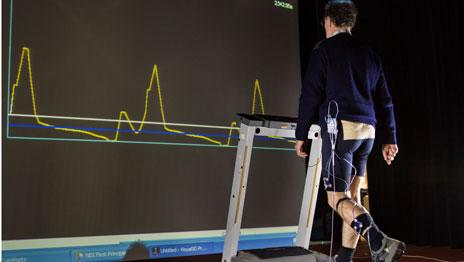
Victoria University researchers are exploring ways that stroke victims can reduce their risk of falling by helping them “retrain their brain” to walk more safely.
Strokes are a major public health issue that affect more than 60,000 Australians a year, or about one person every 10 minutes. Most people who experience a stroke show reduced mobility, impaired balance, and increased probability of tripping and a subsequent fall.
The researchers will study how gait training on a treadmill with real-time biofeedback can improve foot-ground clearance and reduce the risk of tripping, even long after a stroke.
Project leader Professor Rezaul Begg said a pilot study shows that patients who are able to view their foot motion while walking on a treadmill can learn to increase their toe-ground clearance.
“They effectively retrained their brain to learn a safer gait,” he said.
The problem of tripping-related falls is compounded by age because a high percentage of stroke sufferers are elderly.
The four-year study will provide 150 people who have had a stroke six months ago or longer with eight twice-weekly gait-training sessions. In the first sessions, sensors attached to their shoes will measure participants’ foot-ground clearance when walking on a treadmill, while a data projector provides visual information to increase toe-ground clearance. In later trials, feedback will be removed to determine how the participant adapts to the new walking pattern.
While a healthy older woman has a tripping risk of 1-in-183 strides when encountering unforeseen obstacles, a stroke patient’s risk of tripping on average 1-in-3 strides.
Professor Begg said the preliminary study showed that participants reduced their tripping risk to 1-in-161 strides immediately following the training. A month later, that rate was 1-in-20 strides – still a significant improvement from the original 1-in-3 baseline.
As a leading cause of serious long-term disability, strokes can also pose a threat to a person’s independence and quality of life, said Professor Begg.
“This research has additional potential to improve the mental health of stroke sufferers by increasing their confidence in daily activities,” he said.
The $587,000 study is funded through a National Health and Medical Research Council (NHMRC) grant.
Recruitment for participants will begin in early 2016. The study will be conducted at Victoria University’s Institute of Sport, Exercise and Active Living (ISEAL) Biomechanics Laboratory as well as the Austin Hospital and the Royal Melbourne Hospital.
The project’s external research partners are: Dr Cathy Said (Austin Hospital); Professor Mary Galea (University of Melbourne); and Professor Farees Khan (Royal Melbourne Hospital).
VU collaborators are Dr Pazit Levinger, Associate Professor Charles Lawoko and Dr Tony Sparrow.
